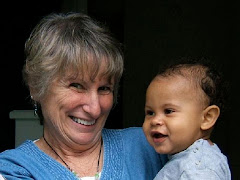Tuesday, May 24, 2011
Parents, Teachers, Caretakers, Mentors...
What emotion do you bring to an interaction with a child with severe behaviors? Are you able to park judgment at the door? Most importantly are you able to park fear at the door and approach that child/children from a place of love? This really is not an idle question as I have witnessed parents and professionals in the last week or so approach several different children from these various perspectives. I don't believe that we, as adults, all the time understand that when we bring judgment, punitive consequences, and criticism into our interactions with children, the basis is fear. As parents, we are afraid that others will judge us for our child's behaviors. As teachers, we fear that our peers, and those in authority over us will judge our teaching methods and our abilities. As CASA's, line staff in residential facilities, as therapists, we fear that we will lose control if we do not take a hard line with the children for whom we have responsibility. And each of these fear based perspectives translate into interactions that present ultimatums, interactions that put the burden of change on the child, interactions that breed fear in the child. If however, we could exit from that place where challenging/severe behavior begets hard nosed, controlling response and enter, instead, a place where we look at behavior as indicative of having meaning...a child communicating something that is happening internally, through their behavior. And most often they could not tell an adult in words what that behavior means. These children with severe behaviors are reacting from a state of stress and fear. They have been triggered in a place in their brain that cannot access reason...they are in a state of freeze, fight or flight. It has no rationale at least in terms of explanation. Their behavior has explained that they are completely dysregulated...meeting that child in a place of calm and understanding (you may not understand what has triggered that child, but you know he/she is not okay)means to respond to that child's needs and not choose those times as times to lay down the law, make the "or else" statements...just let it be a time to show compassion, empathy, understanding, flexibility...in other words, show love.
Subscribe to:
Post Comments (Atom)



No comments:
Post a Comment
I really look forward to both your questions and comments.